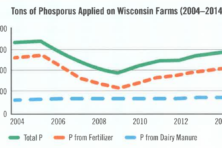Protecting Water Even While It’s Low
- Share
- Tweet
- Pin
- Share
While most of Wisconsin’s marinas are plagued by low water, some are taking steps to protect it.
“Marinas are basically an open wound to the lake,” said Kae DonLevy, Wisconsin Marina Association program manager. “You’ve got this huge parking lot with all the runoff from boats and cars, then you’ve got service buildings. We want to make sure everything marinas are doing is [up] to regulation.”
In 2009 the Wisconsin Marina Association and University of Wisconsin Sea Grant Institute created a guide for marinas to keep water clean, and later launched a certification program for marinas that follow the guidelines. Now, 15 marinas are certified by the Wisconsin Clean Marina Program and two more are pending recertification.
“It’s environmentally friendly,” said Scott Bird, marina manager of Skipper Bud’s Harbor Club and Quarterdeck marinas, both certified clean marinas in Sturgeon Bay. “We figured the state and the federal governments are going to be requiring more and more of all the marinas, so with the Wisconsin Marina Association we took it upon ourselves to get this established.”
To be certified, marinas have to follow state and federal regulations and additional guidelines that reduce runoff and pollution.
Certified marinas can’t just pressure wash boats to clean them. Instead, they have to catch the washing runoff in something, like a bale of hay, so the chemicals are filtered out of the water before it runs into the lake.
DonLevy said it’s worth it for marinas to take steps to protect the lake, despite the extra time and cost sometimes required.
“It shows a marina’s commitment to the community and the future of the industry by doing the best they can to protect water quality,” DonLevy said. “It helps them to manage the marina better, reduce their liability and reduce their cost savings as well.”
Recycling materials instead of dumping them saves cash for many marinas, DonLevy said, and consciously following Clean Marina guidelines keeps marinas from breaking state and federal laws.
Out of the many marinas in Door County only three of them, the Village of Egg Harbor’s marina, the Harbor Club Marina and the Quarterdeck Marina, are certified as Clean Marinas.
“I think with some of these other locations there isn’t someone there directly to deal with it,” Bird said. “It gets a little involved. To do it during the season, you’ve got too much other stuff going on. We have some downtime in the wintertime when we can set up some of this stuff.”
There’s also a $250 certification fee, new since funding for the program was cut in March 2012.
“The boating industry, like everybody else, especially in 2008, took a big hit,” DonLevy said. “As you can imagine it’s pretty costly to run a marina, so to add costs is probably the biggest reason people wouldn’t do it. I think [following clean marina guidelines] makes sense to everybody, they just can’t manage the cost.”
Marinas aren’t the only ones responsible for keeping lakes and harbors clean. The Wisconsin Clean Marina Program lists tips for boaters to protect the water, too.
“People really enjoy boating – they want to enjoy the resource for many years to come so they can respect and appreciate the fact that there are little things you can do to protect water quality,” DonLevy said.
—
Boater tips:
• Dispose of the diluted anti-freeze at a marina or automotive center that accepts and recycles anti-freeze.
• Do not empty your bait bucket into the water. Empty your bait bucket in the trash to help prevent the spread of invasive species and fish diseases.
• After leaving the boat launch, wash your boat, tackle, trailer, and other equipment with hot water or a high-pressure sprayer to kill or remove any exotic species not visible at the boat launch. Or, allow your boat and other equipment to dry thoroughly in the sun for at least five days before moving to another body of water.
• Use non-toxic cleaning alternatives, like mixtures with baking soda, lemon juice or vinegar, instead of chemical products. Dispose of products on shore, not through the drain or into the water.
• Avoid cleaning your boat bottom when it is in the water because toxic antifouling hull paint may be removed and washed into the water.

